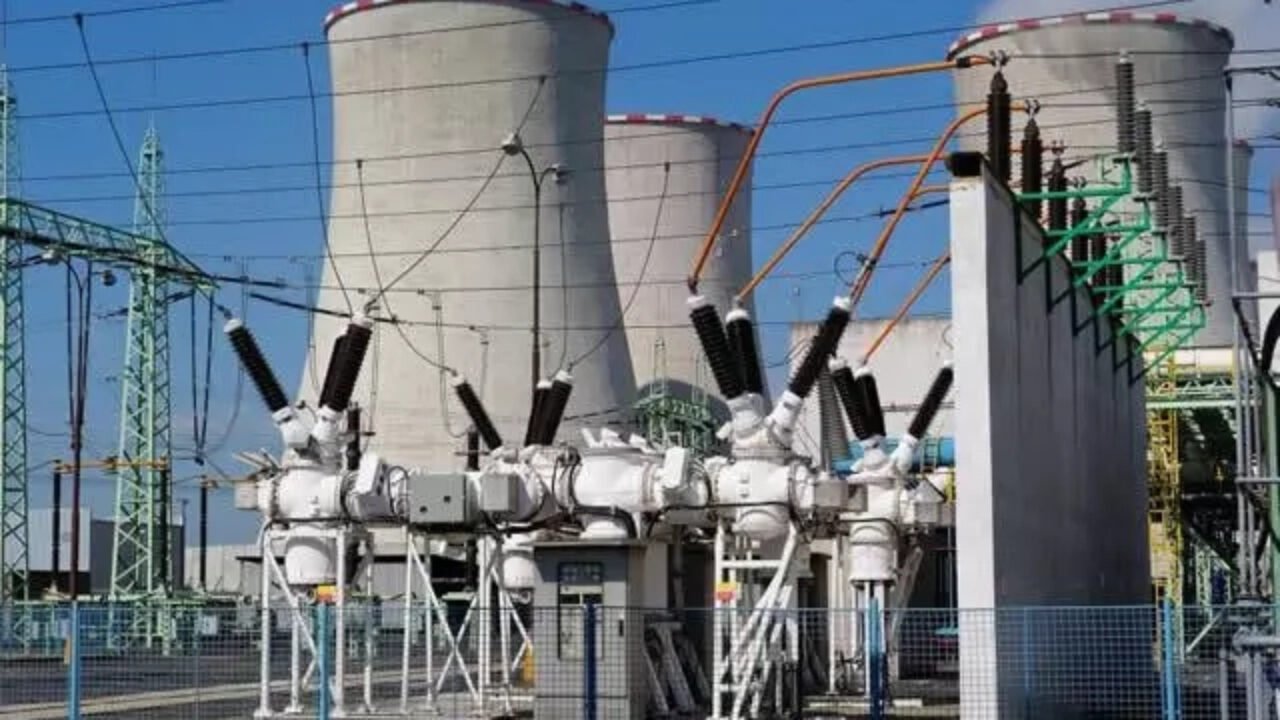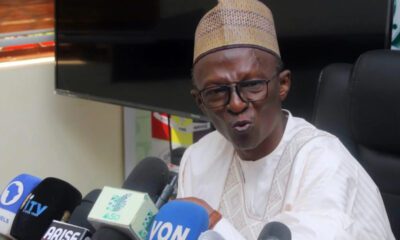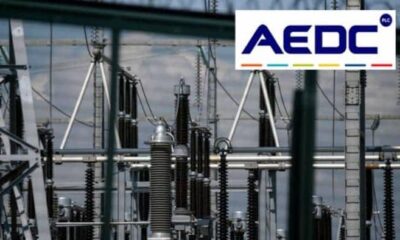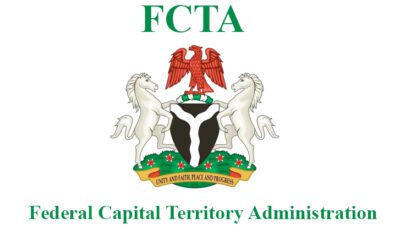Energy
Cooking Gas: Dealers, FCT residents lament price surge, seek FG’s intervention

Some Gas Dealers and FCT residents have decried the surge in the price of Liquefied Petroleum Gas (LPG), known as cooking gas.
According to them, the Federal Government should as a matter of urgency wade into the issue
The dealers and residents who spoke to the newsmen on Sunday in Abuja expressed dissatisfaction over the constant rise in the price of the product and its attendant effects.
Cooking gas is currently sold between N1,300 and N1,600 per Kg as against N900 in November 2023 and N1,000 sold in January 2024.
The Chief Executive Officer of Promise of God Gas Company, Mr Promise Ajujumbu who decried the steady rise in LPG price attributed it to high foreign exchange and cost of transportation of the product.
Ajujumbu appealed to the government to intervene by boosting the local production of gas as well as stabilise the naira because the forex was affecting the cost of LPG greatly.
According to him, 20 tonnes of LPG being sold at N9 million, rose to N19 million currently.
The Automotive Gas Oil (AGO), known as diesel, is used by petroleum transporters and distributors to fuel their trucks which distribute petroleum products to different parts of the country.
Chief Chukwuma Kalu, an official of Shore Gas Limited said the high cost of diesel for transportation of petroleum products, including gas to various routes in the country was a major cause of the surge.
Kalu told journalists that diesel was being sold at about N1, 300 per litre and to fuel a truck to transport gas from Lagos to Abuja requires about 1,000 litres of diesel.
“To transport gas from Lagos to Abuja is very expensive and requires more than N1.5 million. There is nowhere that gas is cheaper in Nigeria, it boils down to cost of transportation.
“The cost at which the end users are buying gas currently is just the surviving cost of the gas plant because dealers are selling at a loss and only sell to maintain their customers.
“In the station, we also use diesel to power our plant for more than 12 hours to dispense gas to customers apart from the electricity token, we buy in addition to multiple taxes/levies we pay in the FCT,” he said.
According to him, the upper takers/major distributors, who import or take directly from the Nigeria Liquefied Natural Gas buy the product in dollars which is affecting the cost too.
He called for a sustainable government policy that could be impactful on the masses economically and socially.
Mrs Grace David, a petty business owner also expressed sadness on the price surge, adding that it had made her resort to the use of firewood and charcoal (Biomass), though not so cheap but served as a relief.
“With the high standard of living currently, it is very worrisome, the government should quickly intervene and bring succour to the citizens,” she said.
Another user, Mr Lawrence Nze said the rate of the increase in LPG price required fast intervention to mitigate the negative effect on the poor masses who were struggling to survive since fuel subsidy removal.
“We are faced with high inflation rate, high food prices, high electricity tariff and high cost of transportation among others. Still the salary remains the same.
“People are not finding it easy at all, they are passing through a lot, let the common man be happy,” Nze said.
The National Bureau of Statistics (NBS), in its “Cooking Gas Price Watch’’ for January 2024, said that the average price of 5kg of cooking gas increased from N4,962.87 recorded in December 2023 to N5,139.25 in January 2024.
The NBS said the average price of 5kg of cooking gas increased on a year-on-year basis by 12 per cent from N4,588.75 recorded in January 2023 to N5,139.25 in January 2024.
Analysis by zone showed that the North-East recorded the highest average retail price at N5,296.32 for 5kg cooking gas, followed by the North-Central at N5,240.36.
Recall that the Minister of State for Petroleum Resources (Gas), Mr Ekperikpe Ekpo recently said it was interacting with critical sectors to halt exportation of LPG in view of its rising cost.
He said all LPG produced within the country would be domesticated to crash the price of gas.
Energy
NERC slashes Band ‘A’ electricity tariff to N206.80 /Kwh


The Nigerian Electricity Regulatory Commission (NERC) has approved a downward review of electricity tariff for Band ‘A’ customers from N225/kWh to N206.80/kwh.
Under the approved review, Band ‘A’ customers who were previously charged N225/Kwh are now to pay N206.80/kwh.
The band’s customers are those who enjoy a daily supply of a minimum of 20 hours.
The review of the tariff was announced in Abuja on Monday by a notice issued by the management of Abuja Electricity Distribution Company (AEDC).
The notice read, ’’ We are pleased to share with you the revised tariff for our Band ‘A’ feeders, which will decrease from N225/kwh to N206.80 effective May 6.
“We assure customers on our Band ‘A’ feeders of continued availability of electricity supply for 20-24 hours daily.
“Please note that the tariffs for Band B, C D and E remain unaffected. ‘’
Energy
Unbundling of TCN will improve access to electricity — Experts


Some power experts have commended the Federal Government’s decision to unbundle the Transmission Company of Nigeria (TCN), saying this will improve access to electricity.
They spoke in separate interviews with journalists on Sunday in Lagos.
Recall that the Nigerian Electricity Regulatory Commission (NERC), on May 3, unbundled the TCN into two separate entities, raising hopes for a more efficient and reliable national grid, potentially leading to increased access to electricity.
NERC, acting under the provisions of the Nigeria Electricity Act, ordered the establishment of an Independent System Operator (ISO) to take over the market and system operations functions of TCN.
According to the order, TCN will retain its transmission service provider licence and continue to maintain power transmission infrastructure across the country.
Chairman, Customer Consultative Forum of Festac/Satellite Town, Dr Akinrolabu Olukayode, described the unbundling as a welcome development to further improve the power sector.
According to Olukayode, the attempt is striving at ensuring a balanced system where the monopoly enjoyed over these few years by TCN is dissolved to allow for new hands who will inject fresh ideas, devoid of monotonous inclined perennial failure as witnessed in recent times.
“The effectiveness of power transmission will largely be determined by the quantum of synergy between power generating channels and structure for maintenance of the grid.
“The generating plants should be energised to full capacity scale,” he said.
The expert urged the government to set 60 percent capital funding to subsidise expenditure on procurement from the budgetary allocation and offer shares for public subscription to keep the sector lubricated.
He said that TCN was partially progressive but undue government influences created rooms for bureaucracy which made its operations ladened with hiccups.
Olukayode said that there was a need for the government to declare a state of emergency in power that will usher in fresh hands to rid the system of saboteurs.
Also, National Coordinator, All Electricity Consumers Protection Forum, Mr Samuel Ilori, described the unbundling of TCN as good and welcoming, while advising the government to do due diligence and avoid the replica of what happened in distribution companies.
Ilori said that the unbundling is expected to improve service delivery and effectiveness, adding that many of the equipment and substations in the sector are moribund and obsolete.
He said that injection of money and expertise to the area of transmission might help stem the tide of incessant collapse of grids and allow what was being generated to be distributed.
“My advice is to scrap the privatisation of the distribution companies in 2013 by President Jonathan administration.
“If proper foundation was laid then and things were done according to the laid down rules of the Bureau of Public Enterprise (BPE) then as headed by Mrs Bolanle Onagoruwa, we will not be having this mess.
“The Siemens contract as of today remains elusive as we do not know what is going on.
“Government needs to declare a state of emergency in the sector to be able to set it on a recovery path,” he added.
A power expert, Mr Toluwalase Godwin, said the new operator would manage electricity demand and supply, ensuring the delivery of electricity where and when needed, without bias, at the lowest cost possible, while ensuring reliability and avoiding grid instability and collapse in the process.
“This means that NISO will be responsible for dispatch management, international transmission, capacity management, and wholesale market in the near future.
“Potentially signalling the near end of life for Nigerian Bulk Electricity Trading Plc, which currently oversees some of NISO’s functions,” he said.
He noted that this development is moving to a more liberalised market where NISO would be increasingly responsible for capacity auction, real-time energy market, ancillary services procurement, day-ahead market, spot market, reserve management, pricing and settlement.
“The separation of responsibilities between entities allows for a concentrated focus, with transmission services management predominantly revolving around technological aspects, while system operations are entrenched in energy economics.”
Energy
FG pegs electricity supply to international customers at 6% of available grid generation


The Federal Government has mandated system operators in the Nigerian power industry to supply not more than six percent of total available grid generation per hour to international customers or off-takers.
In a new order by the Nigerian Electricity Regulatory Commission (NERC) to electricity generation companies on Saturday, the regulator stated that the priority system of prioritising international customers and limiting distribution companies (Discos)’ offtake during times of imbalances in the grid is both inefficient and inequitable.
According to the new order, the aggregate capacity to be allocated by electricity generation companies to international off-takers in the next six months shall not be more than 10 percent of Genco’s generation capacity.
It stated, “The System Operator shall ensure that the maximum load allocation to international off-takers in each trading hour shall not be more than six percent of the total available grid generation.
“The aggregate capacity that can be nominated by a generating plant to service international off-takers shall not be more than 10 percent of its available generation capacity unless in exceptional circumstances a derogation is granted by the Commission.”
Furthermore, the new order mandated the system operators and the Transmission Company of Nigeria (TCN) to install IoT meters at all offtake and delivery points of Eligible Customers, bilateral supplies, cross-border trades, and outgoing 33kv feeders of the DisCos to provide real-time data on supply to offtakers.
The new order also mandates the system operator to publish hourly readings of adherence to grid instructions to check for violations of offtake contracts and also publish the previous day’s hourly log reading to market participants.
The Federal Government has observed that electricity generation companies in times of low grid availability prefer to supply to international customers sometimes above the allocated offtake on the bilateral contracts.
The NERC noted that such practices have caused untold hardship to Nigerians due to irregular supply to Discos, especially during times of high demand, hence this order.
By the order, the Federal Government is prioritising electricity supply to local customers- industrial and residential- following the hike in electricity tariff to Band A customers and the need to ensure the set hours of electricity supply to different categories of local customers is met.
-
capital market2 years ago
Rt.briscoe, FBNH, Others halts negative performance of stock market
-
Finance3 months ago
Court orders Sen. Victor Umeh to repay N136m bank debt to AMCON
-



 Abuja Update2 months ago
Abuja Update2 months agoUNDP, FG partnership needed to achieve inclusion, equity- Minister
-
Abuja Update1 month ago
Banks drive stock market performance with N147bn gain
-



 Business2 weeks ago
Business2 weeks agoTingo Group unveils Tingo Electric, Tingo Cola drink at Lagos launch
-



 Health3 weeks ago
Health3 weeks agoCapacity training will reduce migration of health workers- NPHCDA
-
News4 months ago
Oil thieves sponsoring malicious media campaign against Navy – Spokesman
-



 Infotech1 month ago
Infotech1 month agoWorld Backup Day: NITDA urges Nigerians to ensure backup of data












